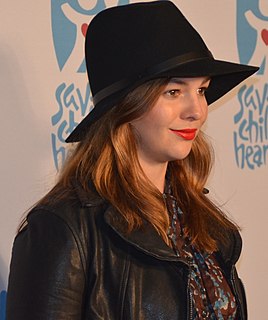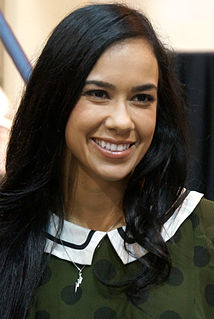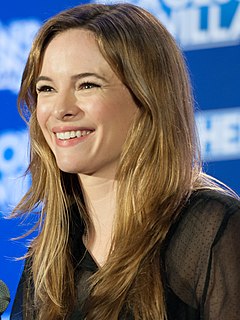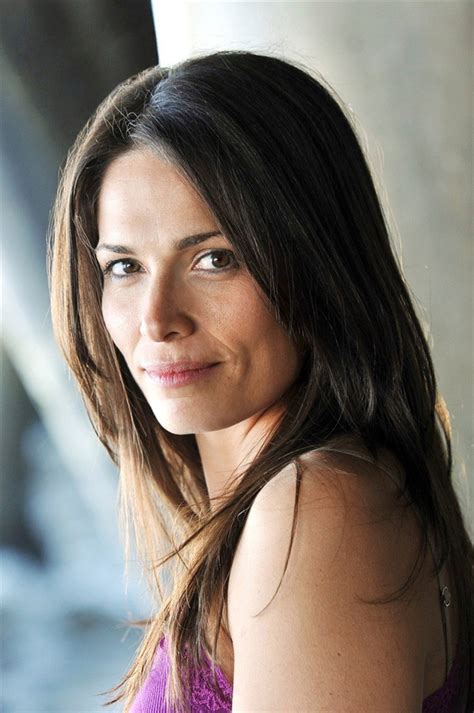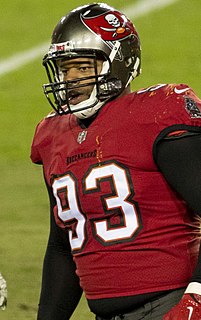A Quote by Lilly Singh
I got into psychology simply because that's what my sister did, and I grew up in a family that was very, like, 'Follow your sister's footsteps.' I went to the same school she went to, did the same degree she did... really had no interest in it, to be honest.
Related Quotes
Obviously, in marketing, the best tool is to show the autobiography in fiction. It's inevitable how that happens, but it's generic. Say I've written a story where my sister dies. 'Well, did your sister die?' No, she did not. But people use those straws to grasp at the difference between reality and fiction.
...fact was she knew more about them than she knew about herself, having never had the map to discover what she was like. Could she sing? (Was it nice to hear when she did?) Was she pretty? Was she a good friend? Could she have been a loving mother? A faithful wife? Have I got a sister and does she favor me? If my mother knew me would she like me? (140)
Amy Poehler did a really cute thing, [] [her son] said his prayers before he went to sleep that she was going to win [a Golden Globe] and when she got home she put [the trophy] in his bedroom. So when he woke up, he was like “Yes I did it, I did it”. He was so excited, he felt like he had somehow engendered the trophy into existence, which is so cute.
The doctor's wife wasn't a bad woman. She was sufficiently convinced of her own importance to believe that God actually did watch everything she did and listen to everything she said, and she was too taken up with rooting out the pride she was prone to feeling in her own holiness to notice any other failings she might have had. She was a do-gooder, which means that all the ill she did, she did without realizing it.
People said things they didn't mean all the time. Everybody else in the world seemed able to factor it in. But not Lena. Why did she believe the things people said? Why did she cling to them so literally? Why did she think she knew people when she clearly didn't? Why did she imagine that the world didn't change, when it did? Maybe she didn't change. She believed what people said and she stayed the same." (Lena, 211)
My mother was the first African-American policewoman in Seattle - recruited, actually - and she did it for only 2 years, as she did not want to carry a gun. She worked mostly on domestic disturbances. The NAACP wanted her to do it. She did not actually have the temperament to be a cop - she was very sweet. She had a Masters in social work.
It was always the same; other people gave up loving before she did. They got spoilt, or else they went away; in any case, they were partly to blame. Why did it happen so? She herself never changed; when she loved anyone, it was for life. She could not understand desertion; it was something so huge, so monstrous that the notion of it made her little heart break.
Ruth hadn't talked to my sister since before my death, and then it was only to excuse herself in the hallway at school. But she'd seen Lindsey walking home with Samuel and seen her smile with him. She watched as my sister said yes to pancakes and no to everything else. She had tried to imagine herself being my sister as she had spent time imagining being me.
Tessa had begun to tremble. This is what she had always wanted someone to say. What she had always, in the darkest corner of her heart, wanted Will to say. Will, the boy who loved the same books she did, the same poetry she did, who made her laugh even when she was furious. And here he was standing in front of her, telling her he loved the words of her heart, the shape of her soul. Telling her something she had never imagined anyone would ever tell her. Telling her something she would never be told again, not in this way. And not by him. And it did not matter. "It's too late", she said.

